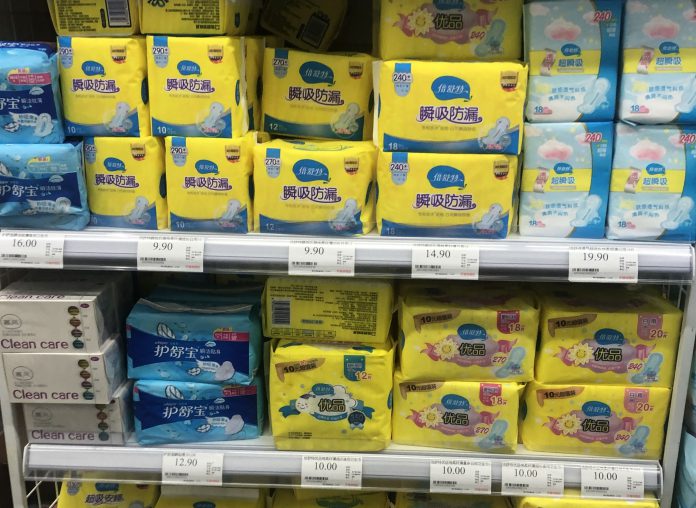Girls from poor families use toilet paper, homework paper and even shreds of old clothes, as they cannot afford to buy tampons.
By Alice Wang in Shandong
Amy* is a fifth-grade girl of a primary school in Guizhou, China. The 11-year-old had menstruation for the first time on October 19.
“I asked my dad to give me RMB ¥30 (US $4.4) for sanitary napkins. But he refused and scolded me that I should feel ashamed of shedding so much blood every month,” Amy cries.
“He refused and scolded me that I should feel ashamed of shedding so much blood every month.”
Amy’s mother has left home to look for jobs and her father is a gatekeeper at a factory. The monthly income of the whole family is around RMB ¥1600 (US $235). The family cannot afford to buy sanitary napkins every month. Amy and her mother have to use toilet paper during menstruation period.
Amy’s family is one of the millions who are living in poverty in China. “There are about 600 million people whose monthly incomes are under RMB ¥1000 (US $147) in China,”, says Chinese Premier Li in the third session of the 13th National People’s Congress in Beijing on May 28.
Wang Wenjun, founder of UU Love Public Good Union says girls in poverty-stricken areas cannot afford to buy sanitary pads. “Girls in poverty-stricken areas would rather walk for two and a half hours in order to save RMB ¥5 (US $0.7) for a car ride,” she says.
Wang says that girls from poor families use toilet paper, homework paper and even shreds of old clothes, as they cannot afford to buy tampons.
“Even if they can buy a sanitary napkin, they reuse many times. That may pose health risks,” Wang adds.
“Even if they can buy a sanitary napkin, they reuse many times.”
In August, netizens had a heated discussion about period poverty on the social media platform Weibo and a post featuring a picture of 100 sanitary napkins being sold at RMB ¥21.99 (US $3.2) – a price that is much lower than that of well-known manufacturers in China on Taobao, an e-commerce platform. Manufacturer of the sanitary napkins is unknown, and they are not packaged in bags.
About 247 thousand messages were recorded under the social media post, and many women admitted that they did not know some low-income women could not afford tampons till they read the Weibo post.

“For those who live on less than RMB ¥1,000 (US $147) a month, personal hygiene is probably the last thing they care about. They have no choice but to buy substandard sanitary napkins at a low price,” Wang says.
Wang started a national initiative to enhance women’s access to sanitary products and introduce sex education for girls in rural areas in 2015.
Wang suggests the government to distribute free pads to girls in rural schools because she finds that sanitary napkins by brand manufacturers cannot be transported to shops in rural area due to poor accessibility.
“Girls can only buy poor quality pads. Many girls and even teachers have gynecological diseases because of using sub-standard sanitary pads in rural areas,” she says.
Wang thinks that handbooks about hygiene knowledge and sex education should be distributed to girls in rural areas and teaching materials should also be developed to promote health education. “Girls in rural areas are shamed for having menstruation and even shamed for being a girl,” Wang adds.

Consumers in China, regardless of their gender, are given a black plastic bag if they buy sanitary pads, as if they are doing something shameful.
In October, some university students launched “menstrual pad mutual help box” campaign at more than 40 universities nationwide.
Liu Ruiming is one of the students who started this campaign at Tianjin University.
“Any woman in need can take a sanitary pad from the “menstrual pad mutual help box” for free and replenish the box later. We want to tell the public that menstruation is just a normal biological phenomenon,” Liu says.

Liu says that girls at Tianjin University all agree it is a great idea to set up the “menstrual pad mutual help box” to help each other. And the girls hope that the campaign can be turned into a regular exercise on campus.
“But some boys criticise us and even make fun of those who take part in the campaign. I have been accused of doing a big show by some male students,” Liu adds.
“I have been accused of doing a big show by some male students.”
Liu plans to leave some post-it notes outside toilets to encourage open discussion. She is planning to hold workshops too. Students can share their experience and feelings. “I wish this can change students’ mindset, especially male students,” she says.
Liu thinks the people have changed their mind bit by bit as series of activities focusing on “period poverty” have aroused their awareness in 2020.
“It is a good start. More and more people are aware and show care about this issue now,” Liu adds.
*Name changed at interviewee’s request
Looking for “Free Periods”
While governments around the world seek to alleviate period poverty in their countries, NGO and volunteers step in to help.
By Fiona Cheung
It all started with a chat between Sara So, founder of Support Africa with trAde (SAWA), and Jessica Young, a social worker who volunteered in Kenya in the summer of 2018. In her trip, Jessica visited slums, distributed meals and gave tutorial classes to students.
“Jessica told me some girls in Kibera (the largest slum in Nairobi, the capital of Kenya) engaged in transactional sex for menstrual products. I was saddened by it.” So, who travels to Kenya frequently, recalls.
In 2019, the duo launched a programme called “We Choose” together. “I thought our organisation could mobilise people on Facebook to volunteer in the project and produce more reusable menstrual pads for the girls,” So says.
After recruiting volunteers through Facebook, So organised briefing sessions about “period poverty” problem in Kenya and held workshops on hand-made reusable pads.
According to the United Nations International Children’s Emergency Fund (UNICEF), at least 500 million girls and women worldwide do not have what they need to manage their menstruation. The inability to manage menstruation with safety, dignity, and comfort may negatively impact the physical and mental health of those who menstruate around the world.
In the end, around 100 volunteers produced 1,000 hand-made reusable sanitary pads for 100 women and girls in Nairobi.
With her experience from SAWA, which aspires to enable Africans living with more abundance and more dignity through trade on a fair basis since its operation in 2013, So arranged the distribution of the products and taught locals how to use them.
“For many women living in the slum, sanitary pads are luxury. They often turn to other alternatives, such as old clothes, in some rural areas, even leaves and chicken feather. This jeopardises their health,” So says.
“For many women living in the slum, sanitary pads are luxury.”
“Or sometimes they may choose to stay home from school and skip school every month. It affects their study and exacerbates gender inequality,” she adds.
So points out menstruation is a social taboo in Kenya, citing a suicide case in which a 14-year-old student killed herself after being humiliated by a teacher for staining her uniform during her period in September, 2019.
In 2018, the United Nations Population Fund published a review paper in menstrual health management in east and southern Africa, stating there were schoolgirls obtaining sanitary pads in exchange for sexual relations. This situation puts young girls at risk of HIV, unwanted pregnancy and school dropout, according to the report.
So believes COVID-19 makes the situation of girls and women suffering from period poverty even more vulnerable.
“Many people become jobless due to the poor economy. Menstrual products become even more unaffordable for underprivileged women,” So says.
“Also, schools in which schoolgirls can seek protection are closed due to class suspension. Schoolgirls cannot receive free sanitary pads like before and they become more vulnerable to being impregnated by people in the community,” So adds.
In view of the impact of the pandemic, So is planning to establish local production of sanitary pads in Kenya. “In recent months, I am thinking of making the project local by training schoolgirls to produce menstrual products for themselves,” So says.
In 2004, Kenya became the first country to drop tax on imported menstrual products for girls and women. In 2011, the government also committed US $3 million to distribute free sanitary pads in schools. The distribution of “free, sufficient and quality sanitary towels” is then expanded to every girl registered at schools in 2017.
This year, Scotland is the first country in the world to make period products free after its parliament unanimously passed the Period Product (Free Provision) Scotland Bill in November. Local authorities would be required to provide free sanitary products to anyone who needs them.
Edited by Lasley Lui & Regina Chen







































